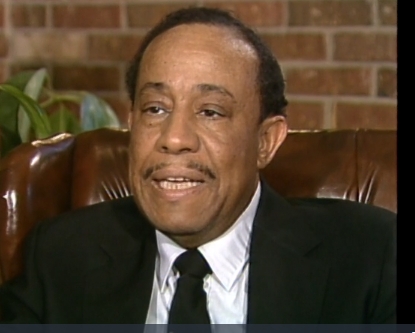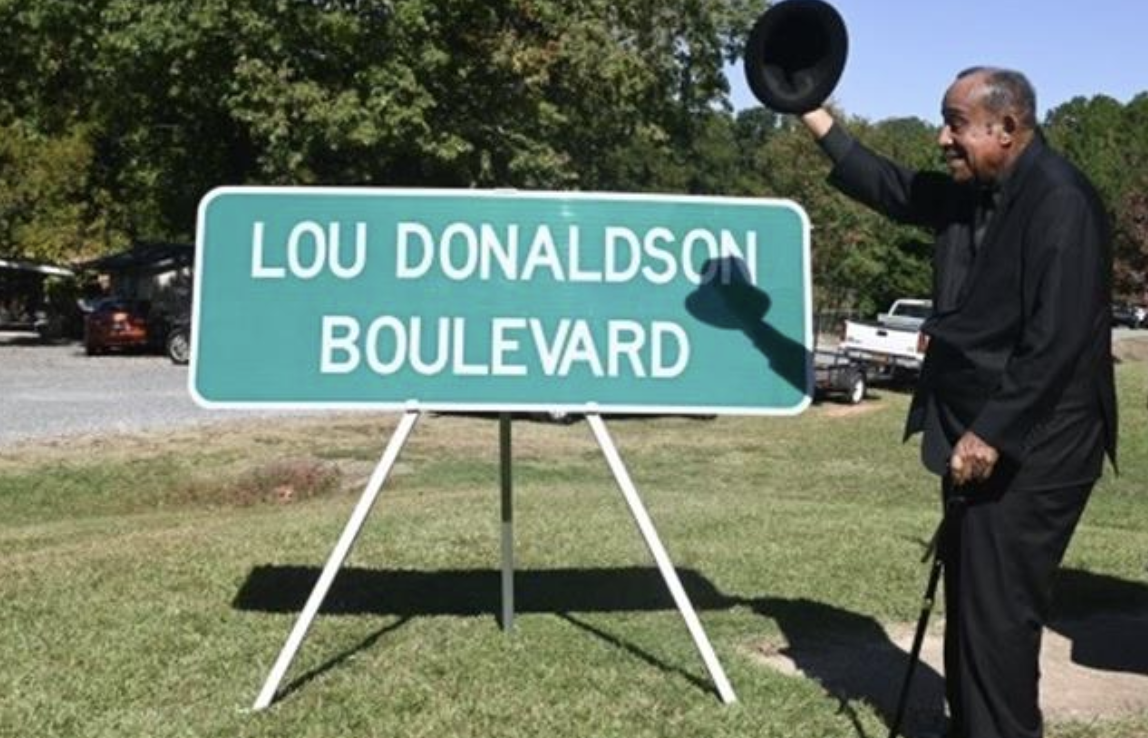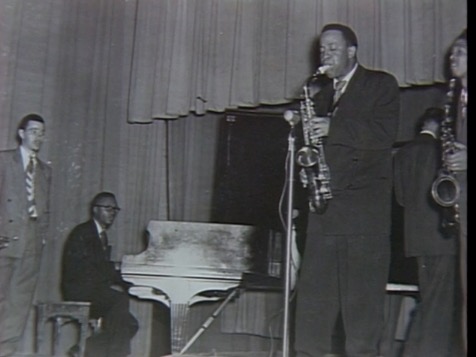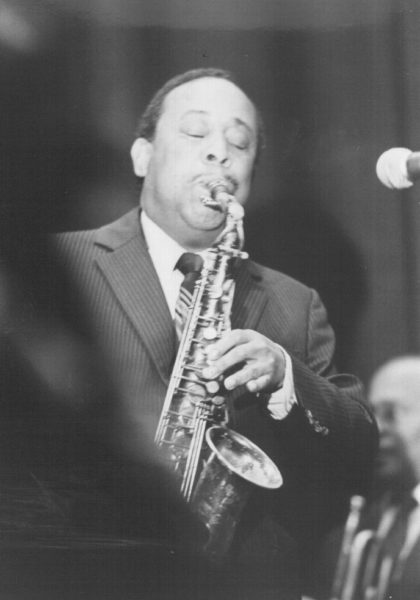
Lou Donaldson, UNC-TV, 1988.
Lou Donaldson, alto sax
Of all the talented Rhythm Vets, Lou Donaldson became the one who made a career out of playing jazz. He resisted at first the idea of moving to New York, but once there he began getting work and the jobs seemed never to end. He told me that he’d love to have moved back to North Carolina, but that New York was the only place he could make a living playing his kind of music.
Donaldson first learned music from his mother, a talented pianist who also taught band and had sent others to A&T before she sent young Lou, who says he was 15 when he enrolled.
Donaldson was born November 1, 1926 in Badin, where he grew up loving baseball more than music. Last year, NCDOT named a section of I-470 “Lou Donaldson Boulevard” in his honor.

“I heard music since I was a little kid, 2 or 3 years old,” he said. “I hated piano, but all of my sisters and brothers played piano.”
Then an Air Corps Band came to Badin, and its White leader, a Mr. Gabriel, got to know his mother, who played concerts with his band: “He found out that I wouldn’t play piano so he said, ‘Well, I’ll give him a clarinet and he just might like that,’ and I started practicing.”
Donaldson told me that origin story in 1986, back when he first suggested that if “Pitch a Boogie Woogie” had been made in 1947, as I was asserting, that he had been playing clarinet on it–a notion he was dissuaded from once he heard the soundtrack: all the Vets would smile when they heard him cut loose on that last track and invariably say, ‘Yeah, that’s Lou.’
When I asked him more recently where Mr. Gabriel had bought that clarinet, he bristled and told this story with a vividness that made it seem like ‘only yesterday’: “He gave me an old clarinet that nobody played anymore–he had thrown it away, it was just sitting around his office and he gave it to my mother,” who “didn’t know anything about clarinet but she knew music so she gave me instructions and I learned how to play it.”
Then, once he got to A&T: “When Bernard Mason saw that clarinet, he broke it over his knee and gave me a Conn, a brand new clarinet, just like Artie Shaw played.”
At A&T, Donaldson became the star of marching and concert bands, a favorite of Walter Carlson, his fellow Rhythm Vet who’d become A&T’s band leader upon his return to Greensboro after the war. Like most of the Rhythm Vets, he also worked with the Max Westerband orchestra, and after the war he was a regular performer at the Artists Guild, often playing with the under-appreciated and barely remembered tenor saxophonist Billy Toles.
Once in the Navy, he was training to be a radio technician; neither he nor his Greensboro buddies Carl Foster and Jehovah Guy had auditioned for band out of a fear of failure. “We didn’t try for band at first because guys there had played with Count Basie, Duke,” Donaldson said, “and so we didn’t go to the audition because we couldn’t play as well as these guys.”
But while it’s true that many of the musicians the Navy was recruiting were from nationally popular bands–some were taken whole–the need was so great for more and more bands that the talent pool got thinner and the recruiting harder.

Donaldson with Carl Foster on piano, courtesy of Mr. Foster.
Then Donaldson told the rest of the story: “One day I just happened to be passing the band room and I heard this squeaking and squawking, and I stuck my head inside the door and said, ‘I hope that guy’s not in the band ’cause I can play a clarinet better than that.’ And the guy who was in there, he was actually doing auditions, and he said, ‘You think you can play a clarinet? Play this.’ And so I played it and he put two or three marches up. And I played them, and I knew them anyway. And he said, ‘You’re the best clarinet player we ever had. Do you play the saxophone?’ And I said ‘Yeah, I can play a saxophone,’ and he was so impressed with my clarinet playing that he never did make me play a saxophone. I probably could have played it ’cause the fingering is about the same. But he never gave me an audition, put me right in the band.”
Donaldson was assigned to US Navy Band 757, which served first at Beeville, Texas, and then at New Orleans.
Back in school at A&T after the war, Donaldson recalled, “Illinois Jacquet’s band came through Greensboro, with old Joe Jones, Papa Joe Jones on drums, and they talked me in to sitting in with the band. And they were impressed, and he said, ‘Boy, you should be in New York,” and I said, ‘Not me.’ I was afraid to really go. But I just thought about it, and kept thinking about it, and I eventually thought, well, I’ll take a chance to go up to New York and see what it’s like. And I went up and I never came back.”
In New York, he had lodging with a brother-in-law and some spending money from the GI bill for studying at a music institute “for about six months,” before he started getting regular work: “So that kind of solidified my economic position so I stayed.”
But Donaldson still recalls those long-ago baseball days with a kind of excited nostalgia. A third baseman, he hit .400, “mostly singles and doubles,” for his hometown Tigers, for whom he played during summers while in school. “I went back to Badin every summer to play ball, ” he said, “to make money for my tuition.”
His teammates were all older, and music eventually took over, if not his interest, then his opportunity. At A&T, the band and gigs kept him from playing baseball, although he chuckled as he recalled going to Aggie baseball practice and challenging their pitching staff: “I’d say strike me out, but they couldn’t do it.”
He hit his only career homerun against Dizzy Gillespie’s team: “They had a pitcher, called him Fast Red, and my ball went down the first base line and hit the chalk, and they hadn’t cut the grass, well, they had misunderstood it was for baseball, and when the ball went in the heavy grass, I came all around, for a home run. And when I came home, they carried me off on their shoulders to the dugout.”
The summer before his senior year at A&T, he went to Norfolk for work in a shipyard for more money than he could make playing baseball.
By 1950, he had moved to New York and embarked on his now legendary career.
• • •

Lou Donaldson performing with the Rhythm Vets, Greenville NC 1987. Photo by Tony Rumple, ECU News Bureau.
Sources
Donaldson, Lou. Telephone interview. 21 Feb. 2024
—. Telephone interview. 18 Aug. 1985
—. Telephone interview. 6 Jan. 1986
—. Personal interview. Fayetteville, NC. 2 Feb. 1987
Miller, Chris. ‘This is the greatest day’: Section of Highway 740 renamed after Badin native, jazz legend Lou Donaldson.” Badin, NC. Stanley News & Press. 14 Oct. 2022. Web. 26 July 2024.
Read more at:
–July 26, 2024